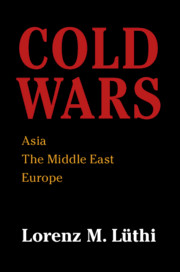Book contents
- Cold Wars
- Cold Wars
- Copyright page
- Dedication
- Contents
- Maps
- Acknowledgments
- Note on Names, Transliterations, and References
- Abbreviations
- Introduction
- 1 From High Imperialism to Cold War Division
- Part I Elusive Unities
- Part II Asia
- Part III The Middle East
- Part IV Alternative World Visions
- Part V Europe between the Superpowers
- Part VI European Détente
- Part VII The End of the Regional Cold Wars
- Introduction to Chapters 20 to 22
- 20 The Middle East
- Chapter 21 Asia
- 22 Europe
- 23 The End of the Superpower Cold War
- 24 Legacies of the Cold War
- Conclusion
- Notes
- Index
20 - The Middle East
from Part VII - The End of the Regional Cold Wars
Published online by Cambridge University Press: 19 March 2020
- Cold Wars
- Cold Wars
- Copyright page
- Dedication
- Contents
- Maps
- Acknowledgments
- Note on Names, Transliterations, and References
- Abbreviations
- Introduction
- 1 From High Imperialism to Cold War Division
- Part I Elusive Unities
- Part II Asia
- Part III The Middle East
- Part IV Alternative World Visions
- Part V Europe between the Superpowers
- Part VI European Détente
- Part VII The End of the Regional Cold Wars
- Introduction to Chapters 20 to 22
- 20 The Middle East
- Chapter 21 Asia
- 22 Europe
- 23 The End of the Superpower Cold War
- 24 Legacies of the Cold War
- Conclusion
- Notes
- Index
Summary
At the turn of the 1970s/1980s, the Middle East witnessed two major events—Israeli-Egyptian rapprochement and the rise of Islamism. From 1977 to 1979, Israel and Egypt negotiated a bilateral peace, which led neither to a region-wide peace nor to a Palestinian state. At the same time, the Islamist Revolution in Iran envisioned the creation of a Shia Persian-led new world system outside of the existing Cold War structures and in competition with Sunni-Arab Islam. In an attempt to seize leadership in the Arab world, Iraq launched war against Iran in 1980. Before, by late 1979, Sunni Islamists had challenged Saudi royal hegemony over the Holy Cities of Mecca and Medina. The Soviet intervention in Afghanistan heated up the Iranian-Saudi competition for worldwide Muslim leadership. The Israeli intervention in the Lebanese civil war in 1982 triggered the growth of Iranian influence and pitted the PLO against its Syrian backer. An American-European military mission to oversee PLO retreat to Tunisia withdrew after several Islamist suicide bombings in 1983. By the mid-1980s, the Middle East had exited the structures of the global Cold War, but the superpowers failed to see it.
- Type
- Chapter
- Information
- Cold WarsAsia, the Middle East, Europe, pp. 493 - 519Publisher: Cambridge University PressPrint publication year: 2020



